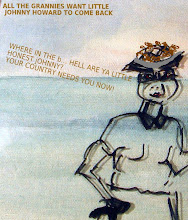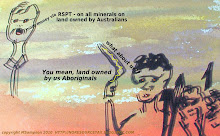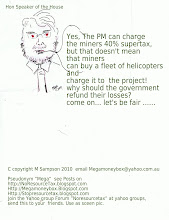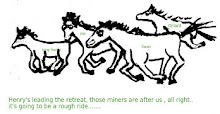Hi to all comfy voters.
Julian Assange (Wikileaks Publisher of leaked govt documents) has already
been on posters with a likeness to Che Guevara, the cuban
revolutionary/terrorist depending on your viewpoint, the one well known in the black beret.
Julian and wikileaks will be seen as freedom fighters and matyrs.(freedom
of the press and anti usa sentiment) the article below about Bob Brown and Julia Gillard puts it so succinctly. When USA senators call for him to be executed, we know we have lost all pretense of justice and fairness, and Aussie independence.
This will prove to be the case of this century. Australians will have do
everything to help him fight this battle. Already he was refused bail, for a trumped up rape case with two women who admit consent. One charge said he used his body weight to coerce, and another says he refused to use a condom when asked. So he is accused of rape and is refused bail in a British court.
If you weren't political before, this case will make you take sides.
kind regards,
Meg
here are two articles.
Julian Assange is Gillard's Hicks blunder
http://www.abc.net.au/unleashed/42082.html
Glenn Milne
Julia Gillard needs to change her approach to condemning WikiLeaks founder
Julian Assange - and quickly.
The risk of him becoming her final equivalent of John Howard's David Hicks
is much more dangerous to Gillard politically than Hicks ever was to Howard.
For the purpose of the Assange comparison it's worth recalling the details
of Hicks political-legal life. According to Assange's web cousin, Wikipedia,
Hicks trained at the Al Qaeda linked Al Farouq training camp in 2001. He was
captured in Afghanistan in December 2001 by the Afghan Northern Alliance and
sold for a $1,000 bounty to the United States military.
He was transported to Guantanamo Bay where he was designated an enemy
combatant, during which time he alleges he was tortured. Charges were first
laid against Hicks in 2004 under a military commission system newly created
by presidential order. Those proceedings failed in 2006 when the US Supreme
Court ruled the system unconstitutional.
Military commissions were subsequently re-established by an act of the US
Congress. Revised charges were laid against Hicks in February 2007 before a
new commission under the new act. The following month, in accordance with a
pre-trial agreement struck with convening authority Judge Susan J Crawford,
Hicks entered a plea to a single new codified charge of "providing material
support for terrorism". Hicks's legal team attributed his acceptance of the
plea bargain to "his desperation for release from Guantanamo".
In April 2007 Hicks was returned to Australia to serve the remaining nine
months of a suspended seven-year sentence. I lay out the facts to stress the
longitude of the Hicks case. This is important when we come to consider the
comparison of Gillard's relative knee-jerk reaction to Assange.
During the time his case lingered Hicks, despite admitting to carrying out
terrorist acts in the Indian border with Pakistan, became the poster boy for
so-called "Howard haters" across the country and internationally. Initially,
and for a good stretch of time afterwards, Howard's tough political line on
Hicks worked a treat for him in an electorate looking for the emotional post
9/11 security, albeit of the Marvel comic book form, offered up by George W
Bush's "war on terror".
But by the time of the 2007 election voters were jaundiced against Howard
generally. Swept up in that swing away from Howard personally was his
treatment of Hicks. Somewhere along the line Australians' notion of a "fair
go" kicked in and voters came to see Hicks's imprisonment without trial as
oppressive. Even Howard, in his recent memoirs "Lazarus Rising", admits he
vilified Hicks for too long and it ended being a net negative for him
politically.
Here it must be said that Julia Gillard is no John Howard. Which is exactly
the point. And also where the danger lies for the current Prime Minister
with her decision to try to smash Assange and his reputation so totally and
so fast and regardless of legal niceties.
Chief among those legal niceties is that Assange has not yet been found
guilty of any offence by any court anywhere in the world. That has not
stopped Gillard in her new role as information age Executioner-in-Chief
already judging Assange guilty of heinous - albeit undefined - crimes.
Here's what the Prime Minister had to say on Tuesday. She argued firstly
that the "foundation stone" (whatever that is) of the WikiLeaks website was
illegal. Then this: "We have the Australian Federal Police (AFP) looking to
see whether Australian laws have been broken and then we've got the gross
irresponsibility of this conduct."
Come Friday the AFP apparently still had not determined whether any of the
Australian laws Gillard cited had been broken. The remarkable nature of
Gillard's complete disregard for the notion of the presumption of innocence
was highlighted immediately by condemnation from both the shadow
attorney-general, George Brandis SC, and Malcolm Turnbull, who made his
legal and political bones by defending a Cold War MI5 agent's attempts to
publish his memoirs of an eventful life in the celebrated "Spycatcher" case.
But let's put the law to one side for the moment and simply focus on the
politics.
Howard's initial successful exploitation of the Hicks case rested on the
fact that he effectively drove a wedge between Labor's blue collar
mainstream base (who where anti-Hicks) and its Left urban civil libertarian
grouping, which in the end proved more articulate, persuasive and principled
when it came to Hicks. Over seven years they won the day by winning over the
majority of Australians, if not to their cause at least to their case.
In the Assange matter Gillard has done exactly the same as Howard. Except
she is the one doing the wedging between herself and a critical part of her
own Labor base. Consider who turned up at Assange's London committal hearing
with self publicity serving offers of bail backing; Australian left-wing
proselytizer, polemicist and general anti-US myth maker John Pilger,
millionaire celebrity cricket divorcee, Jemima Kahn, and film maker Ken
Loach. None of them had actually met Assange.
Such is the Townsville born Australian's capacity to mobilise and divide
public opinion. Back in Australia when social activists Jeff Sparrow and
Elizabeth O'Shea posted an open letter to Gillard on The Drum about her
pre-emptive legal condemnation of Assange the site received more than 4,000
comments, mostly signatures in support of the appeal, before collapsing,
literally, under the weight of the response.
The names of some of these signatories is informative: Julian Burnside,
Peter Singer, Adam Bandt, Mungo MacCallum, Webdy Bacon, Alastair Nicholson,
Julian Morrow, Helen Garner, Dennis Altman, Stepphen Keim, Hilary McPhee and
Greg Barns among lots of others.
You get the picture. In the broad this is the same group that defended
Hicks, condemns the treatment of asylum seekers, opposed the Iraq war, and
probably the war in Afghanistan. Most were - and are - "Howard haters". They
are natural Labor supporters. But Gillard's clumsy and morally suspect
assault on Assange has now emphatically pitted her against her most
articulate constituency.
And she hasn't even got it right on the broader front of mainstream
Australians. Howard, at least at the start, successfully mobilised this
group against David Hicks. This is not the case with Assange. A newspoll
published in The Australian on Thursday showed a massive 74.7 per cent of
Australians were opposed to any attempts to extradite Assange to the US.
That's "extradite", remind yourself. We haven't even got near the question
of whether he should be jailed - or incredibly as some US Right-wing desktop
assassins are suggesting - that he be taken out. On the ABC News Radio
website 88 per cent of respondents answered "no" to the question of whether
the Australian Government was acting "appropriately" towards Assange.
And surely that is the threshold question here. What has Assange done wrong
in the minds of the Australian public? To date no-one has died as a result
of his actions. He's dumped a bucketful of information onto the net which
most foot soldiers in a democracy (ie voters), who feel routinely threatened
by big government, probably feel their entitled to. And, most importantly
when it comes to public opinion, there are no pictures of Assange with a
rocket-propelled grenade, slung over his shoulder in Chechnya either.
So unlike Howard in the case of Hicks, Gillard does not even have majority
support on her side at the beginning of what will inevitably be the Assange
legal saga. And into whose arms is she driving the Labor culturally elite
malcontent cohort represented by Assange's celebrity supporters? Why Bob
Brown's of course.
Unlike Gillard, Brown, the dominant politician within the Government, knows
instinctively where his base is. He immediately knifed Gillard without qualm
on Assange declaring: "What we need from the Foreign Minister or the
Attorney-General is clear evidence that the Australian Government is
materially assisting to ensure that Assange's legal rights are met and that
everything is done possible to ensure that he is not fitted out with a
process to have him extradited to Sweden and then to the US under political
pressure that's not publicly obvious."
No niceties from Brown who's meant to be a coalition partner in a
Green-Labor Government. So Right when Brown has split the ALP and the
Government on totemic niche issues like gay marriage, right when Gillard
needs to shore up her Left flank, what does she do? She blows it on Assange.
It's a metaphor really for a Government and a Prime Minister that right now,
seemingly can't take a trick.
Glenn Milne has been covering Canberra politics for more than two decades.
http://www.dailytelegraph.com.au/news/wikileaks-founder-julian-assange-plans-to-surrender/story-e6freuy9-1225967047285
WikiLeaks founder Julian Assange plans to surrender
a.. Lucy Carne, European correspondent
b.. From: The Daily Telegraph
c.. December 07, 2010 2:54PM
WikiLeaks founder Julian Assange. Source: AP
THE hunt may soon be over for WikiLeaks founder Julian Assange, as the
fugitive Australian plans to surrender to British police overnight.
Scotland Yard was expected to serve the 39-year-old with a European Arrest
Warrant over alleged sexual assaults in Sweden earlier this year.
The warrant forms the first steps in extraditing Mr Assange, who is believed
to be in hiding with friends southeast of London, to Sweden for questioning
over the "sex crimes" claims.
Two women - who met Mr Assange when he was in Sweden for lectures - claimed
he sexually attacked them.
Both said they had consensual sex with the notorious campaigner, but said he
refused to wear a condom.
In more bad news for the Australian fugitive, it has emerged that another
source of WikiLeaks' crucial funds has been frozen in an attempt to cripple
the whistleblowing website.
Start of sidebar. Skip to end of sidebar.
Related Coverage
a.. Terror targets leaked
b.. Julian Assange: Murder threats to family
a.. Worldwide rallies to defend Assange Adelaide Now, 11 hours ago
b.. WikiLeaks spy charge 'not on' Herald Sun, 1 day ago
c.. WikiLeaks rival 'to open Monday' Herald Sun, 1 day ago
d.. It was only a matter of time before web war Courier Mail, 2 days ago
e.. Teen WikiLeaks 'hack-tivist' arrested The Daily Telegraph, 2 days ago
End of sidebar. Return to start of sidebar.
MasterCard has pulled the plug on payments to WikiLeaks, news website CNET
reported.
The move will further financially starve the embattled website.
"MasterCard is taking action to ensure that WikiLeaks can no longer accept
MasterCard-branded products," MasterCard Worldwide spokesman Chris Monteiro
said.
"MasterCard rules prohibit customers from directly or indirectly engaging in
or facilitating any action that is illegal."
WikiLeaks has responded to threats on its funding with online pleas to "Keep
us strong." People could still donate to the website using Visa, bank
transfers, or sending donations by old-fashioned "snail mail."
The sudden move follows US Government pressure on any companies connected to
WikiLeaks to "immediately terminate its relationship with them".
WikiLeaks estimated they have so far lost Au$133,000 from missed donations
due to the payment source collapses this week.
Swiss authorities also yesterday shut down a bank account belonging to Mr
Assange.
The Swiss Post Office's banking arm said it closed an account set up by the
Australian after he gave a false home address for Geneva but could not prove
he lived there.
WikiLeaks had advertised the PostFinance account details online to "donate
directly to the Julian Assange and other WikiLeaks Staff Defense Fund,"
giving an account name of "Assange Julian Paul, Geneve."
WikiLeaks was also recently dropped by its US servers and is now based out
of Switzerland.
It was also recently dumped by online payment service PayPal.
WikiLeaks also battled technological attacks when a "hacktivist" shut down
the website for 28 hours during last weekend.
Those responsible for the attack said in a statement on Twitter that the
hack was revenge for WikiLeaks "attempting to endanger the lives of our
troops, other assets & foreign relations".
He said the US Justice Department had "a very serious, active, ongoing
investigation that is criminal in nature" into the WikiLeaks saga.
Mr Assange sent a chilling threat to the US government saying if he was
prosecuted or assassinated he would unlock a 'poison pill' - the entire
archive of internal cables which have been downloaded in a secret document
by more than "100,000 people".
Since last Monday WikiLeaks have released just 1000 of the 251,287 cables .
Mr Assange has said he would appeal any charges stemming from the Swedish
sexual assault claims.
"We will fight them and expose them, naturally," he told Spain's El Pais
newspaper on Saturday.
"That there is something "wrong" with this case is now obvious to everyone."
His lawyer Mark Stephens, of Stephens Finers Innocent, said he believed the
Swedish claims were a "political stunt".
Mr Stephens confirmed British police had telephoned him to notify him that
they would serve the extradition request from Sweden.
He refused to confirm whether his client was in Britain, but said the
meeting would take place somewhere in Britain.
"The arrangements I have been making are for him to come and meet the
British police," Stephens said, without giving a date for the interview.
One British newspaper reported that Mr Assange would be expected to post
bail of between 100,000 pounds and 200,000 pounds and would need up to six
people offering surety.
But Mr Stephens said while he had been informed of the warrant, he knew
nothing of a pending court appearance.
"I have not concluded any arrangements with the police at this time," he
said.
The US Government was also yesterday increasing their efforts to prosecute
Mr Assange for criminal activity over WikiLeaks' release of 250,000 US
diplomatic cables.
Despite being an Australian citizen, Mr Assange would still be put on trial
in America, legal experts said.
US Attorney General Eric Holder said the Obama administration was
considering using laws under the Espionage Act to prosecute Mr Assange over
releasing information that threatened public safety.
40 comments on this story
skip to main |
skip to sidebar

Julia's portrait for the PM Hall

Where in the B..Hell are you Johnny?
Twitter
We have to link together like an internet cobweb. The More spiders the better
What you can do besides writing to editors, politicians, and speaking up, is to become followers on as many blogs and forums and twitter sites which oppose the Resource Super profit Tax, as possible. If you forward information on the tax to as many people as possible, you will raise awareness. This tax is unconstitutional, and PRRT contains secrecy clauses, which means if you were a "whistleblower" you could be liable for $10,000 fine and or 2 years jail. Worse still, you could not present any documents relating to that company to the court.
When you become a follower, you help raise the status of the campaign. You can Email our cartoons, or pics. use them as screensavers and as an opportunity to raise the Supertax issue. Respect our efforts by adding our links, and giving credit for our volunteered work.
When you become a follower, you help raise the status of the campaign. You can Email our cartoons, or pics. use them as screensavers and as an opportunity to raise the Supertax issue. Respect our efforts by adding our links, and giving credit for our volunteered work.
Julia PM -barring all

Julia's portrait for the PM Hall
Welcome! to my Election Blog
This blog is written and authorised by NSW senate candidate Megan Sampson Wollongong (silent elector address)
My main election blog is at Http://megansampson.blogspot.com
you can email me at msmegansampson at gmail dot com
Get to know more..
see my other blogs at
Http://msmegansampson.blogspot.com
http://megamoneybox.blogspot.com
http://reduceyouruse.blogspot.com
http://cutcarbonuse.blogspot.com
http://www.permculturevisions.com
My main election blog is at Http://megansampson.blogspot.com
you can email me at msmegansampson at gmail dot com
Get to know more..
see my other blogs at
Http://msmegansampson.blogspot.com
http://megamoneybox.blogspot.com
http://reduceyouruse.blogspot.com
http://cutcarbonuse.blogspot.com
http://www.permculturevisions.com
Vote for Megan Sampson in NSW senate.Col K.
Make your own solar panels!
All the grannies want Little Johnny Howard back

Where in the B..Hell are you Johnny?













